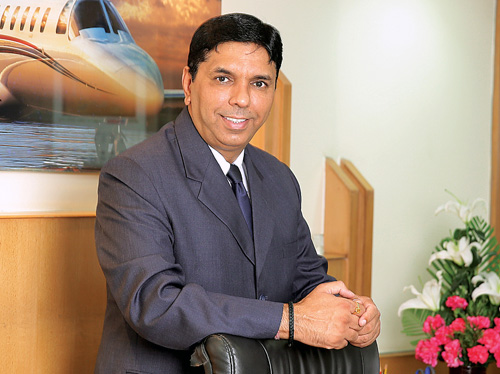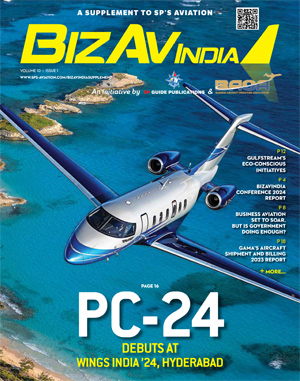In a Club of its Own
It is the country’s largest and oldest private air charter service provider and has been growing steadily, despite the many challenges. The Director and CEO of Club One Air, Bhupesh Joshi, while welcoming the revised draft of the National Civil Aviation Policy, talks to BizAvIndia about air charter business in general and Club One Air’s activities in particular.

BizAvIndia (BAI): Could you give a profile of Club One Air?
Bhupesh Joshi (Joshi): We are India’s largest and oldest private air charter service provider with a fleet of eight aircraft which have the capability to fly and meet the needs of our guests even beyond our national borders.
BAI: How many aircraft you have, please give the aircraft make and seating capacity?
Joshi: At present, we have three types of aircraft — Cessna C-II and XL, Falcon 2000 and CRJ 100 with luxury seating capacity of 7-18 guests. The aircraft promises luxury beyond imagination and the services are unparalleled. Over all, the experience that we want our guests to have is that of simple awe!
BAI: What is the nature of your operations?
Joshi: We have extended our services to as many sectors as possible. From the corporates to the regular holidayer and celebs; almost everyone has travelled Club One Air. With our fleet strength, we are capable of operating multiple flights to multiple cities on any given date. We have charter flights that take you on pilgrimage sightseeing, to sporting destinations as well as adventure holiday spots. In short, we have a charter to ferry you for all your needs.
BAI: What is your unique selling proposition and differentiator in the market?
Joshi: We are the only company which has its own MRO (maintenance, repair and overhaul) in place and has specialised technicians to take care of every maintenance need of our aircraft fleet. In the business segment that we operate in, we provide end-to-end customised solution to our guest’s requirements.

BAI: Are there any expansion plans for Club One Air, if yes, could you give details?
Joshi: Yes, we are looking to increase our fleet size to 19 by the end of 2019. Along with a thought-out expansion plan, we are also looking to increase our footprint in various other service segment of guests and the airport services.
NCAP LOOKS PROMISING
BAI: The government has announced the revised draft National Civil Aviation Policy. Could you give your reaction on how it may impact positively business aviation, if at all?
Joshi: The draft looks very promising. There are some apparent take-aways from the entire plan. The upgradation of airports will open new routes for travellers. However, all this will only be possible with multi-pronged approach by the Centre and state governments. The Rs. 5,000 crore business of MRO services which caters to just 10 per cent in India will get a major boost if the draft is implemented as it will bring in business from various sources.
Air charter operators face taxation hurdles in India, most of the things are taxed which makes the operating costs higher. The parking charges, fuel charges, maintenance charges, etc, are the pain points for our segment.
BAI: While we see that the government is keen on increasing regional connectivity, it has not taken into consideration the role and GA/BA can play in this regard. Could you highlight how charter business can really help connecting un-served destinations, thus improving regional connectivity?
Joshi: Again, it is a matter of infrastructure and skill development. Out of 476 airstrips only 75 are operated by scheduled airlines. On the other hand, NSOPs like us operate up to 100 airstrips. So, upgrading more and more strips will put more destinations on our map which will help us to promote these locations for our guests who would want to travel to these destinations for their purpose.
TIME RIPE FOR FOREIGN PLAYERS TO ENTER
BAI: The government has also announced opening up of FDI in general aviation/business aviation. Your take on that and how do you think this will help the industry?
Joshi: There is already a FDI in helicopter business but barring one or two foreign companies nobody came forward. However, with time the economic might of India has grown and entrepreneurship boom has seen the arrival of many big players in the market along with huge investments in various segments. The trend looks more upbeat on the aviation front where the industry has grown at 10-15 per cent and NSOPs business has grown by 20-30 per cent. So the time is right for foreign players to enter the market and create competitive environment in the whole segment.
BAI: Tourism is one of the drivers for business aviation if we look at some of the developed countries. What linkages are missing between tourism and aviation?
Joshi: I feel infrastructure has a big role to play. It is this infrastructure that brings connectivity to lot many places. Airports act as the gateway to other cities or regions and there are so many destinations in India that are not even promoted just because of the connectivity issues.
BAI: What are the challenges of an air charter operator in India, from buying an aircraft to flying them?
Joshi: Air charter operators face taxation hurdles in India, most of the things are taxed which makes the operating costs higher in India. The parking charges, fuel charges, maintenance charges, etc, are the pain points for our segment. Though some good suggestions have been given in MRO segment but we still need to experience the final policy to see the light of the day. There is already a duty of 2.5 per cent for importing new aircraft to India which can be done away with, the duty only hinders the procurement process and makes it tough for players like us to get to the break-even without further investment.
BAI: What do you think the government further needs to do to ease operations of business aviation industry?
Joshi: There are lot many things that need to be done. Some of them have been listed in the draft and we are hoping those will be met with. However, the policies should be flexible enough with a scope of manoeuvrability to make necessary changes at later stages. That is the need of the hour.





